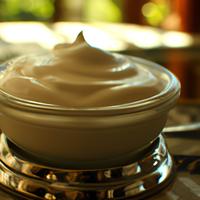
1 serving (15 grams) contains 30 calories, 0.5 grams of protein, 2.5 grams of fat, and 1.0 grams of carbohydrates.

Log this food in SnapCalorie

Nutrition Information
Calories |
473.2 | ||
|---|---|---|---|
% Daily Value* |
|||
| Total Fat | 39.4 g | 50% | |
| Saturated Fat | 23.7 g | 118% | |
| Polyunsaturated Fat | 0 g | ||
| Cholesterol | 157.7 mg | 52% | |
| Sodium | 157.7 mg | 6% | |
| Total Carbohydrates | 15.8 g | 5% | |
| Dietary Fiber | 0 g | 0% | |
| Sugars | 15.8 g | ||
| protein | 7.9 g | 15% | |
| Vitamin D | 0 mcg | 0% | |
| Calcium | 236.6 mg | 18% | |
| Iron | 0 mg | 0% | |
| Potassium | 157.7 mg | 3% | |
* Percent Daily Values are based on a 2,000 calorie diet. Your daily values may be higher or lower depending on your calorie needs.
Food Attributes
Source of Calories
About Light cooking cream
Light Cooking Cream is a versatile dairy product often used to enhance dishes with a rich, creamy texture while maintaining a lower fat content compared to regular cream. Typically made from milk and cream, this reduced-fat option contains around 18%-20% milk fat, making it a lighter alternative for recipes requiring creaminess without excess heaviness. Popular in European and Mediterranean cuisine, it is ideal for sauces, soups, casseroles, and some desserts, providing a smooth consistency without overpowering flavors. While light cooking cream is lower in fat and calories than heavy cream, it still contains saturated fats, which should be consumed in moderation. It offers a source of calcium and certain vitamins, but it is not a low-calorie choice overall. Those seeking healthier alternatives can consider plant-based substitutes or use light cooking cream sparingly as part of a balanced diet.



